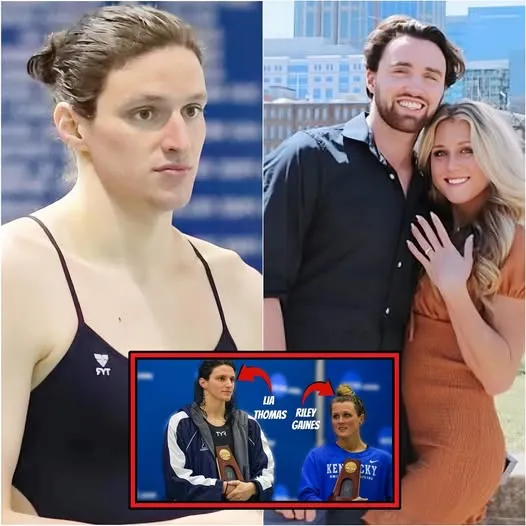The world of competitive swimming has been rocked by a major development—Lia Thomas, the transgender athlete who made headlines for her dominance in women’s swimming, has reportedly lost all her medals. In a surprising twist, former University of Kentucky swimmer Riley Gaines, a vocal advocate for fairness in women’s sports, is now positioned to recover the titles and records that were once in dispute. This development has sparked intense debate, drawing in political figures, sports organizations, and advocacy groups.

The Controversial Rise of Lia Thomas
Lia Thomas, a former University of Pennsylvania swimmer, gained widespread attention when she transitioned from competing in men’s swimming to women’s events. Her performances shattered records, sparking a heated debate over transgender athletes’ inclusion in women’s sports. Critics argued that her participation gave her an unfair advantage, citing biological differences that could not be nullified by hormone therapy alone. Supporters, however, defended her right to compete based on inclusivity and non-discrimination policies.
The controversy escalated when Thomas won the NCAA Women’s Division I Championship in the 500-yard freestyle, becoming the first openly transgender athlete to secure a national title in women’s swimming. While many celebrated her victory as a milestone for LGBTQ+ representation, others, including Riley Gaines, voiced strong opposition, arguing that Thomas’ participation deprived biological female athletes of fair competition.
Why Has Lia Thomas Lost Her Medals?
Recent developments suggest that Thomas has been stripped of her accolades due to external pressures from governing bodies and policy changes regarding transgender athletes. The specifics behind this decision remain unclear, but speculation points to several factors:
Policy Revisions by Sports Federations – In 2022, FINA, the world governing body for swimming, implemented stricter regulations barring transgender athletes from competing in elite women’s events if they had undergone male puberty. This rule change signaled a shift toward protecting competitive integrity.
Legal Challenges and Public Pressure – Advocacy groups, athletes, and political figures have continued to challenge Thomas’ wins, arguing that they violated principles of fairness in women’s sports. Mounting legal and social pressure may have influenced the decision to rescind her victories.
NCAA’s Stance on Retroactive Actions – While the NCAA initially allowed Thomas to compete, the organization has faced backlash and may have reassessed its stance, leading to her medals being revoked.
Riley Gaines: The Face of the Fight for Fairness
Riley Gaines, a former All-American swimmer, has emerged as one of the most vocal critics of transgender inclusion in women’s sports. She famously tied with Thomas for fifth place in the 200-yard freestyle but was told by NCAA officials that Thomas would be given the trophy for photo opportunities—a moment that fueled her activism.
Since then, Gaines has testified before Congress, spoken at numerous events, and aligned with organizations pushing for legislation that protects women’s sports. With Thomas’ titles now reportedly voided, Gaines stands to benefit as she could be retroactively awarded medals and rankings she missed out on.
What This Means for Women’s Sports
The revocation of Thomas’ medals and the potential reassignment of titles to Riley Gaines and other female swimmers mark a significant shift in the conversation surrounding gender and athletics. This case could set a precedent for future policies, reinforcing the argument that biological advantages must be considered when ensuring fair competition.
However, the decision also raises ethical and legal questions. Should medals be retroactively reassigned? How should sports organizations balance inclusion with fairness? These questions remain at the heart of an ongoing debate that extends beyond swimming to all women’s sports.
Conclusion
The saga of Lia Thomas and Riley Gaines is far from over. While Thomas losing her medals might be seen as a victory for some, it also reignites broader discussions on gender identity, fairness, and the evolving landscape of competitive sports. As regulations continue to shift, the sports world will be watching closely to see how governing bodies handle similar cases in the future.
What do you think? Should past victories be overturned, or should sports find a different way to address this complex issue?





